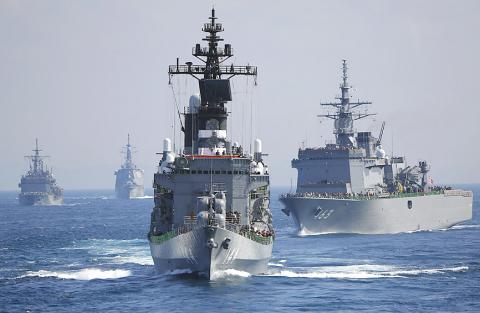The Japanese Cabinet yesterday approved a record-high military spending plan, endorsing plans to purchase pricey US surveillance drones and F-35 jets as Tokyo steps up cooperation with Washington amid China’s increasingly assertive activity in regional seas.
The ¥5.1 trillion (US$42.1 billion) proposal is part of a ¥96.7 trillion national budget for the fiscal year beginning in April, also an all-time high. The entire package requires Japanese parliamentary approval.
Military spending would rise 1.5 percent from this year, the fourth annual increase under Japanese Prime Minister Shinzo Abe, who ended a decade of defense budget cuts.

Photo: AP
The defense budget is the first since Japan enacted new security legislation in September enhancing the nation’s military role and since Japan revised its bilateral defense guidelines with the US earlier in the year to allow broader cooperation between the allies.
The new security law divided Japanese public opinion, with opponents saying it would increase a possibility of Japan being embroiled in a US-led war.
Japan is bolstering surveillance and defense of its southern islands, where it has a territorial dispute with China.
The budget also includes the purchase of an advanced Aegis radar-equipped destroyer with missile-defense capability, submarine construction and sonar development.
The Japanese Ministry of Defense plans to spend ¥14.8 billion this year on some of the multibillion-dollar, multi-year purchase of three “Global Hawk” unmanned drones, as well as six F-35 jets for ¥138 billion and a Boeing mid-air refueling aircraft KC-46A at ¥23 billion.
“We believe the budget includes items that would contribute to enhancing Japan-US cooperation in the area of ISR,” Japanese Ministry of Defense official Tomoki Matsuo said, referring to information, surveillance and reconnaissance.
Japan pays ¥193 billion for about 50,000 US troops stationed in Japan under their bilateral security treaty, more than half of them on Okinawa — a major source of friction between the central government and the southern island, which is frustrated with the decades-long burden.
The cost to move some of them to Guam and a contentious plan to move the US Marine air base from the crowded Futenma area to a less-populated location on Okinawa was also added to the budget.

ENDEAVOR MANTA: The ship is programmed to automatically return to its designated home port and would self-destruct if seized by another party The Endeavor Manta, Taiwan’s first military-specification uncrewed surface vehicle (USV) tailor-made to operate in the Taiwan Strait in a bid to bolster the nation’s asymmetric combat capabilities made its first appearance at Kaohsiung’s Singda Harbor yesterday. Taking inspiration from Ukraine’s navy, which is using USVs to force Russia’s Black Sea fleet to take shelter within its own ports, CSBC Taiwan (台灣國際造船) established a research and development unit on USVs last year, CSBC chairman Huang Cheng-hung (黃正弘) said. With the exception of the satellite guidance system and the outboard motors — which were purchased from foreign companies that were not affiliated with Chinese-funded

PERMIT REVOKED: The influencer at a news conference said the National Immigration Agency was infringing on human rights and persecuting Chinese spouses Chinese influencer “Yaya in Taiwan” (亞亞在台灣) yesterday evening voluntarily left Taiwan, despite saying yesterday morning that she had “no intention” of leaving after her residence permit was revoked over her comments on Taiwan being “unified” with China by military force. The Ministry of the Interior yesterday had said that it could forcibly deport the influencer at midnight, but was considering taking a more flexible approach and beginning procedures this morning. The influencer, whose given name is Liu Zhenya (劉振亞), departed on a 8:45pm flight from Taipei International Airport (Songshan airport) to Fuzhou, China. Liu held a news conference at the airport at 7pm,

Taiwan was ranked the fourth-safest country in the world with a score of 82.9, trailing only Andorra, the United Arab Emirates and Qatar in Numbeo’s Safety Index by Country report. Taiwan’s score improved by 0.1 points compared with last year’s mid-year report, which had Taiwan fourth with a score of 82.8. However, both scores were lower than in last year’s first review, when Taiwan scored 83.3, and are a long way from when Taiwan was named the second-safest country in the world in 2021, scoring 84.8. Taiwan ranked higher than Singapore in ninth with a score of 77.4 and Japan in 10th with

GRIDLOCK: The National Fire Agency’s Special Search and Rescue team is on standby to travel to the countries to help out with the rescue effort A powerful earthquake rocked Myanmar and neighboring Thailand yesterday, killing at least three people in Bangkok and burying dozens when a high-rise building under construction collapsed. Footage shared on social media from Myanmar’s second-largest city showed widespread destruction, raising fears that many were trapped under the rubble or killed. The magnitude 7.7 earthquake, with an epicenter near Mandalay in Myanmar, struck at midday and was followed by a strong magnitude 6.4 aftershock. The extent of death, injury and destruction — especially in Myanmar, which is embroiled in a civil war and where information is tightly controlled at the best of times —